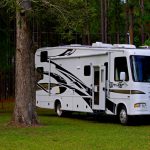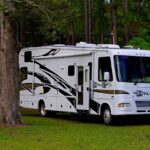Imagine waking up to a new sunrise every day, your home rolling along scenic highways, and the world as your backyard. Sounds dreamy, right? But can you realistically live in an RV full-time without losing your mind or your wallet? Spoiler alert: it’s not just about packing your bags and hitting the road. From choosing the perfect rig to managing utilities, finances, and even loneliness, full-time RV living is a wild ride filled with unexpected twists and turns.
In this comprehensive guide, we’ll unpack 15 essential truths about life on wheels—myths busted, challenges revealed, and insider tips shared from the RV Brands™ experts who’ve been there, done that, and lived to tell the tale. Whether you’re a weekend warrior or dreaming of ditching your stationary home for good, this article will help you decide if the RV lifestyle is your next great adventure or a road best left untraveled.
Key Takeaways
- Full-time RV living offers unmatched freedom but demands serious planning around space, utilities, and budget.
- Choosing the right RV type and size is crucial—bigger isn’t always better!
- Managing water, power, and waste requires daily attention, especially when boondocking.
- Reliable internet and connectivity are essential for work and entertainment on the road.
- Maintenance, weather, and social isolation are real challenges but can be mitigated with preparation and community.
- Top brands like Winnebago, Airstream, and Grand Design provide excellent full-time living options.
Ready to find your perfect home on wheels?
- Shop top RV brands on RVShare | Winnebago | Airstream | Grand Design
Table of Contents
- ⚡️ Quick Tips and Facts About Living in an RV
- 🏕️ The Road to Freedom: A Brief History of Full-Time RV Living
- 🔍 Can You Really Live in an RV? Debunking Myths and Realities
- 1️⃣ Choosing the Right RV for Full-Time Living: Types, Sizes, and Features
- 2️⃣ Essential RV Amenities for Comfortable Full-Time Living
- 3️⃣ Managing Utilities on the Road: Water, Power, and Waste Solutions
- 4️⃣ Staying Connected: Internet, Phone, and Entertainment While Mobile
- 5️⃣ Financial Realities: Budgeting, Costs, and Saving Money Living in an RV
- 6️⃣ Health and Safety on the Road: Medical Care, Security, and Emergency Preparedness
- 7️⃣ Social Life and Community: Making Friends and Staying Connected
- 8️⃣ Handling Work and Productivity While Living Full-Time in an RV
- 9️⃣ Dealing with Challenges: Weather, Maintenance, and Loneliness
- 🔧 What I Wish I Knew Before Going Full-Time RV: Insider Tips and Lessons Learned
- 🌍 Exploring the Lifestyle: Benefits and Drawbacks of Living in an RV Full-Time
- 🚐 Best RV Brands and Models for Full-Time Living: Our Top Picks
- 📅 Planning Your Route: How to Choose Campgrounds and Stay Legal
- 💡 Sustainable RV Living: Eco-Friendly Tips and Tricks
- 🎒 Minimalism and Organization: Maximizing Space in Your Mobile Home
- 🛠️ Maintenance and Repairs: Keeping Your RV Road-Ready
- 📚 Recommended Links for Aspiring Full-Time RVers
- ❓ Frequently Asked Questions About Living in an RV
- 🔗 Reference Links and Resources
⚡️ Quick Tips and Facts About Living in an RV
Thinking about ditching the traditional house keys for an RV door? 🚐 Living in an RV full-time is a bold lifestyle choice that’s growing in popularity, but it’s not all sunshine and campfires. Here at RV Brands™, we’ve gathered the must-know nuggets to get you started on the right foot.
Quick Facts You Should Know
- Space is king: Bigger isn’t always better. Many full-time RVers regret buying oversized rigs that are hard to maneuver or park. Conversely, too small means cramped living and limited storage.
- Utilities require constant attention: Managing water, power, and waste is a daily task, especially if you boondock (camp without hookups).
- Internet is your lifeline: Reliable connectivity can be tricky on the road. Cellular hotspots and satellite internet are popular but require planning.
- Budget realistically: Full-time RV living can be more expensive than expected. Fuel, maintenance, campground fees, and unexpected repairs add up.
- Community matters: Loneliness is real. Building relationships with fellow RVers or local communities is essential for mental well-being.
- Seasonal planning is crucial: Winterizing your rig and choosing climates wisely can make or break your experience.
Pro Tips from RV Brands™ Experts
- Rent before you buy: Test-drive different RV types and sizes to find your sweet spot.
- Learn basic maintenance: Plumbing, electrical, and mechanical skills save headaches and money.
- Plan your domicile state: For legal, tax, and mail purposes, pick a state with RV-friendly laws like Florida, South Dakota, or Texas.
- Invest in quality solar panels and batteries: They extend your off-grid freedom and reduce campground dependency.
For more detailed insights, check out our Full-Time RVing category.
🏕️ The Road to Freedom: A Brief History of Full-Time RV Living

Full-time RV living isn’t a new fad—it’s a lifestyle with roots stretching back to the early 20th century. The rise of affordable motorhomes post-WWII and the baby boomer generation’s quest for adventure fueled the movement. Today, it’s a blend of retirees, remote workers, and wanderlust seekers embracing mobility and minimalism.
Evolution Highlights
- 1920s-1950s: Early trailers and motorhomes were basic and bulky, mostly for weekend camping.
- 1960s-1980s: Improved designs and amenities made longer stays feasible. The Interstate Highway System boosted accessibility.
- 2000s-Present: Internet connectivity and remote work options exploded, making full-time RVing practical for younger generations.
This history shows that while the gear and tech have evolved, the core appeal remains: freedom, flexibility, and connection to nature.
🔍 Can You Really Live in an RV? Debunking Myths and Realities
Let’s bust some myths and lay down the cold, hard truths about full-time RV living.
Myth 1: “It’s just like camping.”
❌ Reality: It’s a full lifestyle change. You’re living in a compact, mobile home with all the responsibilities that entails.
Myth 2: “You save tons of money.”
✅ & ❌ Reality: You can save on property taxes and mortgages, but fuel, maintenance, and campground fees add up. Budget carefully!
Myth 3: “You’ll be isolated.”
✅ & ❌ Reality: While loneliness can hit, many RVers find vibrant communities on the road and online.
Myth 4: “It’s easy to find parking anywhere.”
❌ Reality: Many cities and parks have restrictions. Planning your stops is essential.
Myth 5: “You don’t need to work.”
❌ Reality: Unless retired or independently wealthy, you’ll need income. Remote work or seasonal jobs are common.
For a deep dive, see our article on The Dirty Truth of Full-Time RVing.
1️⃣ Choosing the Right RV for Full-Time Living: Types, Sizes, and Features
Picking your home on wheels is the foundation of your journey. Let’s break down the main types and what fits your lifestyle.
| RV Type | Space Rating | Maneuverability | Amenities | Best For |
|---|---|---|---|---|
| Class A Motorhome | 9/10 | 4/10 | 10/10 | Luxury, full amenities, long-term stays |
| Class B Campervan | 5/10 | 9/10 | 6/10 | Solo travelers, urban areas |
| Class C Motorhome | 7/10 | 7/10 | 8/10 | Families, balanced features |
| Fifth Wheel Trailer | 8/10 | 5/10 | 9/10 | Families, stationary stays |
| Travel Trailer | 6/10 | 6/10 | 7/10 | Budget-conscious, flexible |
| Pop-Up Camper | 3/10 | 10/10 | 4/10 | Occasional use, small groups |
What to Consider
- Size vs. Mobility: Larger rigs offer space but can be a nightmare to drive and park.
- Layout: Look for floorplans with enough storage, a comfortable kitchen, and sleeping arrangements.
- Tank Capacities: Bigger fresh water, grey, and black water tanks mean longer boondocking.
- Insulation & Heating: Essential for colder climates. Look for models with heated tanks and insulated walls.
- Brand Reliability: Brands like Winnebago, Airstream, Forest River, and Grand Design have strong reputations.
Personal Story:
One of our RV Brands™ team members started with a 40-foot fifth wheel and quickly downsized to a 30-foot Class C after struggling with tight campgrounds and stressful towing. Lesson learned: start smaller, upgrade later.
👉 CHECK PRICE on:
- Winnebago Class C: RVShare | Winnebago Official
- Airstream Travel Trailer: RVShare | Airstream Official
2️⃣ Essential RV Amenities for Comfortable Full-Time Living
Living full-time means your RV needs to feel like home — and that means comfort and convenience.
Must-Have Amenities
- Full Kitchen: Stove, oven, microwave, and a fridge large enough for your needs.
- Bathroom: A decent shower and toilet setup; composting toilets are an option for boondockers.
- Heating & Cooling: HVAC systems to handle all seasons.
- Laundry: In-unit washer/dryer or access to laundry facilities.
- Storage: Clever cabinetry and under-bed storage to maximize space.
- Workspace: A dedicated area for remote work or hobbies.
Bonus Features
- Solar Panels & Batteries: For off-grid power.
- Slide-Outs: Expand your living space when parked.
- Entertainment Systems: Satellite TV, streaming devices, and sound systems.
Drawbacks to Watch For
- Tiny kitchens and bathrooms can feel cramped.
- Slide-outs add complexity and maintenance.
- Extra features increase weight and fuel consumption.
3️⃣ Managing Utilities on the Road: Water, Power, and Waste Solutions
Utility management is the heartbeat of RV living. Mastering this keeps your home running smoothly.
Water Management
- Fresh Water: Tank sizes vary; larger tanks mean fewer fills.
- Grey Water: Wastewater from sinks and showers; must be dumped at designated sites.
- Black Water: Sewage tank; requires careful monitoring to avoid backups and odors.
Power Options
- Shore Power: Plugging into campground electricity.
- Generator: Portable or built-in for off-grid power.
- Solar Power: Growing in popularity for sustainability and independence.
- Batteries: Lithium-ion batteries offer longer life and lighter weight.
Waste Disposal
- Dump Stations: Found at campgrounds, gas stations, and RV parks.
- Portable Waste Tanks: For boondockers to transport waste to dump stations.
Pro Tip:
Invest in a tank monitoring system to avoid surprises. Brands like Thetford and Lippert Components offer reliable sensors.
4️⃣ Staying Connected: Internet, Phone, and Entertainment While Mobile
In today’s world, staying connected is non-negotiable, especially if you work remotely or want to stream your favorite shows.
Internet Solutions
- Cellular Hotspots: Use your phone’s data or dedicated devices; coverage depends on carrier.
- Satellite Internet: Options like Starlink RV provide global coverage but can be pricey.
- Campground Wi-Fi: Often unreliable and slow; don’t rely solely on it.
Phones and Communication
- Dual SIM Phones: For switching carriers based on location.
- VOIP Services: Apps like Skype or Zoom for calls over Wi-Fi or cellular data.
Entertainment
- Streaming Devices: Roku, Amazon Fire Stick, or Apple TV.
- Offline Media: Download movies and music for areas with poor connectivity.
5️⃣ Financial Realities: Budgeting, Costs, and Saving Money Living in an RV
Money talk! Can you really save by living in an RV? The answer is: it depends.
Major Expenses
| Expense Category | Notes |
|---|---|
| Fuel | Significant, especially for large rigs |
| Campground Fees | Vary widely; public lands are cheaper/free |
| Maintenance & Repairs | Regular upkeep is essential |
| Insurance | Full-time RV policies differ from vacationers |
| Food & Supplies | Grocery costs similar to home living |
| Internet & Phone | Cellular plans and equipment |
Budgeting Tips
- Join membership campgrounds like Thousand Trails for discounted stays.
- Boondock when possible to save on fees.
- DIY maintenance to cut labor costs.
- Track expenses meticulously using apps like Mint or You Need A Budget.
Perspective from RV Life:
One couple aimed for $100/day but found monthly expenses averaging $5,000 due to fuel and campground fees. Plan for surprises!
6️⃣ Health and Safety on the Road: Medical Care, Security, and Emergency Preparedness
Your home on wheels needs to be a safe haven.
Medical Care
- Locate nearby clinics and hospitals before settling in a new area.
- Carry a well-stocked first aid kit and necessary medications.
- Consider telemedicine services for remote consultations.
Security
- Install security cameras and alarms on your RV.
- Use wheel locks and hitch locks to deter theft.
- Be cautious about parking locations; research safety ratings.
Emergency Preparedness
- Keep emergency supplies: water, food, flashlight, batteries, and tools.
- Have a roadside assistance plan tailored for RVs (e.g., Good Sam Roadside Assistance).
- Know evacuation routes in case of natural disasters.
7️⃣ Social Life and Community: Making Friends and Staying Connected
Life on the road can be lonely, but it doesn’t have to be.
Building Community
- Join RV clubs and online forums like iRV2 and RVillage.
- Attend RV rallies and meetups to connect face-to-face.
- Volunteer at campgrounds or local events to meet locals.
Maintaining Relationships
- Schedule regular video calls with family and friends.
- Invite guests to visit your RV home.
- Share your journey on social media to stay connected.
8️⃣ Handling Work and Productivity While Living Full-Time in an RV
Working on the road is a reality for many full-time RVers.
Work Options
- Remote jobs: Freelancing, consulting, customer service, and creative work.
- Seasonal jobs: Campground host, national park staff, or local gigs.
- Entrepreneurship: Online stores, blogging, or coaching.
Creating a Workspace
- Dedicate a quiet corner with good lighting.
- Invest in ergonomic seating and a stable desk surface.
- Use noise-cancelling headphones to block distractions.
Connectivity and Tools
- Reliable internet is critical (see Staying Connected section).
- Use cloud services for file access.
- Schedule your work hours to balance productivity and exploration.
9️⃣ Dealing with Challenges: Weather, Maintenance, and Loneliness
No sugarcoating here—full-time RV living has its hurdles.
Weather Woes
- Extreme heat or cold requires proper insulation and HVAC.
- Storms and high winds can be dangerous; always have a backup plan.
- Winterizing your rig is essential to prevent pipe damage.
Maintenance Headaches
- Expect regular repairs: tires, roof seals, appliances, and plumbing.
- Learn basic DIY fixes or find trusted RV service centers.
- Keep a maintenance log to track repairs and schedules.
Battling Loneliness
- Stay connected with communities (see Social Life section).
- Engage in hobbies and local activities.
- Consider traveling with a partner or pet for companionship.
🔧 What I Wish I Knew Before Going Full-Time RV: Insider Tips and Lessons Learned
If only someone had told us these before hitting the road! Here are the golden nuggets from RV Brands™ veterans.
Top Lessons Learned
- Start small and upgrade: Don’t buy the biggest rig first.
- Test your route and campgrounds with scouting trips.
- Invest in quality tires and suspension; they make a world of difference.
- Keep a well-stocked toolkit and learn basic repairs.
- Plan for downtime; not every day is an adventure.
- Be flexible and patient; unexpected issues will arise.
- Document your journey; it helps with troubleshooting and memories.
Anecdote:
One team member recalls a freezing night in Montana when their water lines froze because they underestimated insulation needs. Lesson? Winterize early and thoroughly!
🌍 Exploring the Lifestyle: Benefits and Drawbacks of Living in an RV Full-Time
Let’s weigh the scales of this adventurous lifestyle.
Benefits ✅
- Freedom to travel and explore new places at your own pace.
- Minimalist lifestyle reduces clutter and stress.
- Closer connection to nature and outdoor activities.
- Cost savings on property taxes and utilities.
- Community of like-minded adventurers.
Drawbacks ❌
- Limited space and privacy.
- Ongoing maintenance and repairs.
- Weather vulnerability.
- Potential loneliness and social isolation.
- Legal and logistical challenges (domicile, mail, insurance).
🚐 Best RV Brands and Models for Full-Time Living: Our Top Picks
Here’s where we get to the fun part—our favorite rigs for full-time living, rated by our RV Brands™ experts.
| Brand | Model | Design (1-10) | Functionality (1-10) | Reliability (1-10) | Best For |
|---|---|---|---|---|---|
| Winnebago | View Class C | 9 | 9 | 9 | Families, balanced living |
| Airstream | Classic Travel Trailer | 10 | 8 | 10 | Luxury, style-conscious |
| Grand Design | Reflection 315RLTS | 9 | 9 | 8 | Spacious fifth wheel |
| Forest River | Rockwood Mini Lite | 8 | 8 | 7 | Budget-friendly, lightweight |
| Thor Motor Coach | Chateau Class A | 8 | 8 | 7 | Affordable Class A option |
Why These?
- Winnebago View offers a perfect blend of size, drivability, and luxury.
- Airstream Classic is iconic for a reason—durable, stylish, and comfortable.
- Grand Design Reflection shines for those wanting a fifth wheel with residential features.
👉 Shop these brands on:
📅 Planning Your Route: How to Choose Campgrounds and Stay Legal
Route planning is an art form that balances adventure with practicality.
Types of Campgrounds
- Private RV Parks: Full hookups, amenities, but pricier.
- Public Campgrounds: State and national parks offer natural beauty but limited services.
- Public Lands (BLM, National Forests): Free or low cost, but no hookups and limited stays.
Booking Tips
- Book popular campgrounds well in advance, especially in peak seasons.
- Use apps like Campendium and AllStays for reviews and availability.
- Scout your route for low-clearance bridges and weight restrictions.
Staying Legal
- Establish a domicile state for vehicle registration and taxes.
- Understand local parking and overnight stay laws.
- Respect campground rules and leave no trace.
💡 Sustainable RV Living: Eco-Friendly Tips and Tricks
Want to reduce your footprint while living large on the road? Here’s how.
Green Practices
- Solar panels reduce reliance on fossil fuels.
- Composting toilets minimize water use and waste.
- LED lighting cuts electricity consumption.
- Water-saving fixtures help conserve precious resources.
- Recycling and minimal waste: Carry reusable containers and avoid single-use plastics.
Bonus:
Consider joining eco-conscious RV groups for support and ideas.
🎒 Minimalism and Organization: Maximizing Space in Your Mobile Home
Small space, big impact! Organization is key to sanity.
Space-Saving Hacks
- Use multi-functional furniture (e.g., beds with storage).
- Vertical storage: hooks, shelves, and hanging organizers.
- Declutter regularly; keep only essentials.
- Use collapsible kitchenware and stackable containers.
- Label everything for quick access.
Personal Story:
One RV Brands™ team member swears by magnetic spice jars and collapsible laundry baskets—small changes that make a huge difference!
🛠️ Maintenance and Repairs: Keeping Your RV Road-Ready
Your RV is your home and vehicle—keep it in tip-top shape.
Routine Maintenance
- Check tires for wear and proper inflation monthly.
- Inspect roof seals and seams for leaks seasonally.
- Service engine and generator regularly.
- Clean and sanitize water tanks quarterly.
DIY Repairs
- Learn to fix minor plumbing leaks and electrical issues.
- Carry spare parts like fuses, hoses, and bulbs.
- Use online forums and YouTube tutorials for guidance.
When to Call a Pro
- Complex engine or transmission problems.
- Structural damage or major electrical faults.
- HVAC system repairs.
📚 Recommended Links for Aspiring Full-Time RVers
- Full-Time RVing on RV Brands™
- Thousand Trails Membership Campgrounds
- iRV2 Forums
- Progressive RV Insurance
- Campendium Campground Reviews
❓ Frequently Asked Questions About Living in an RV
Q: Can I live in an RV year-round?
A: ✅ Yes, with proper planning for weather, utilities, and legal domicile.
Q: What’s the best RV size for full-time living?
A: It depends on your needs, but many recommend 25-35 feet for balance.
Q: How do I get mail while on the road?
A: Use a mail forwarding service or a trusted family member’s address.
Q: Is full-time RV living expensive?
A: It varies widely; budgeting and lifestyle choices are key.
Q: Can I work remotely from an RV?
A: Absolutely! Many RVers work online using cellular or satellite internet.
🔗 Reference Links and Resources
- RV Life: Living in an RV Full Time Tips
- Roadtrippers: Your Guide to Full-Time RV Living
- Hopscotch the Globe: Reasons Not to Live Full-Time in an RV
- Thetford: RV Sanitation Products
- Good Sam: Roadside Assistance for RVers
Ready to hit the road with confidence? Keep these insights handy, and remember: the journey is just as important as the destination! 🚐💨
Conclusion

So, can you realistically live in an RV? Absolutely — but it’s not a decision to take lightly. Full-time RV living offers unmatched freedom, adventure, and flexibility, but it also demands careful planning, adaptability, and a willingness to embrace a minimalist lifestyle. From choosing the right rig to managing utilities, budgeting, and maintaining your home on wheels, every aspect requires attention and effort.
Our deep dive into RV types, amenities, and lifestyle realities shows that while the road is full of excitement, it’s also paved with challenges like maintenance, weather extremes, and occasional loneliness. But with the right mindset, tools, and community, these hurdles become part of the adventure.
If you’re considering jumping in, start small — rent different RVs, test your route, and learn the ropes before committing. Brands like Winnebago, Airstream, and Grand Design offer excellent options for full-time living, balancing comfort and reliability.
Remember the golden rule: the best RV is the one that fits your lifestyle, budget, and travel dreams. So buckle up, plan smart, and get ready to explore the open road — your new home awaits! 🚐✨
Recommended Links
👉 Shop RV Brands and Models Mentioned:
- Winnebago Class C Motorhomes: RVShare | Winnebago Official Website
- Airstream Travel Trailers: RVShare | Airstream Official Website
- Grand Design Fifth Wheels: RVShare | Grand Design Official Website
- Forest River Rockwood Mini Lite: RVShare | Forest River Official Website
- Thor Motor Coach Chateau: RVShare | Thor Motor Coach Official Website
Essential RV Accessories and Tools:
- Thetford RV Sanitation Products: Thetford Official Website
- Good Sam Roadside Assistance: Good Sam Official Website
Books for Aspiring Full-Time RVers:
- “The RV Handbook: Essential How-To Guide for the RV Owner” by Dave Solberg — Amazon Link
- “Full-Time Freedom: How to Live the RV Dream” by Mike & Jennifer Wendland — Amazon Link
- “The Complete Guide to Full-Time RV Living” by Bob Borson — Amazon Link
❓ Frequently Asked Questions About Living in an RV
What are the pros and cons of living in an RV full-time?
Pros:
- Freedom and flexibility to travel anywhere, anytime.
- Minimalist lifestyle encourages decluttering and simplicity.
- Closer connection to nature and outdoor activities.
- Potential cost savings on property taxes and utilities.
- Strong sense of community among fellow RVers.
Cons:
- Limited space and privacy, which can be challenging with family or guests.
- Ongoing maintenance and repairs due to constant movement.
- Weather vulnerability, especially in extreme climates.
- Legal and logistical challenges such as domicile, insurance, and mail forwarding.
- Potential social isolation if community connections aren’t maintained.
How much does it cost to live in an RV, including maintenance and insurance?
Costs vary widely based on RV type, travel frequency, and lifestyle choices. Major expenses include:
- Fuel: Can be significant, especially for large motorhomes.
- Campground fees: Range from free public lands to premium private parks.
- Maintenance and repairs: Regular upkeep is essential; expect to budget for tires, seals, appliances, and engine service.
- Insurance: Full-time RV insurance policies differ from vacation coverage and may include liability and emergency expenses.
- Utilities: Internet, propane, and water costs add up.
- Food and supplies: Similar to home living but may require more frequent shopping.
A realistic monthly budget often falls between moderate to high five figures annually, but savvy budgeting and boondocking can reduce costs.
What are the best RVs for full-time living, and what features should I look for?
Best RVs:
- Winnebago View Class C: Balanced size, luxury, and drivability.
- Airstream Classic Travel Trailer: Iconic design, durability, and comfort.
- Grand Design Reflection Fifth Wheel: Spacious and residential-feeling.
- Forest River Rockwood Mini Lite: Lightweight and budget-friendly.
- Thor Chateau Class A: Affordable luxury motorhome.
Key Features to Look For:
- Adequate living and storage space without sacrificing maneuverability.
- Large fresh water and waste tanks for extended boondocking.
- Heating and cooling systems suitable for your climate.
- Reliable insulation and weatherproofing.
- Slide-outs for extra space when parked.
- Solar power readiness and upgraded batteries.
- Functional kitchen and bathroom with full amenities.
Can you really downsize to an RV, and what are the most important things to consider when transitioning to RV life?
Yes, downsizing is possible but requires a mindset shift and practical planning.
Key Considerations:
- Declutter ruthlessly: Keep only essentials and sentimental items that fit your space.
- Storage solutions: Invest in multi-functional furniture and smart organizers.
- Lifestyle changes: Embrace minimalism and adapt to smaller living quarters.
- Financial planning: Understand your new budget, including unexpected expenses.
- Trial runs: Rent an RV or take short trips to test your readiness.
- Legal logistics: Set up domicile, mail forwarding, and insurance before hitting the road.
- Community support: Connect with experienced full-timers for advice and encouragement.
🔗 Reference Links and Resources
- Living in an RV Full Time Tips – RV Life
- Your Guide to Full-Time RV Living – Roadtrippers
- Full-Time RV Living – 20 Reasons Why You Shouldn’t Do It – Hopscotch the Globe
- Winnebago Official Website
- Airstream Official Website
- Grand Design RV Official Website
- Forest River Official Website
- Thor Motor Coach Official Website
- Thetford RV Sanitation Products
- Good Sam Roadside Assistance
Ready to roll? With these insights, you’re equipped to make your RV living dream a reality — adventure awaits! 🚐✨




